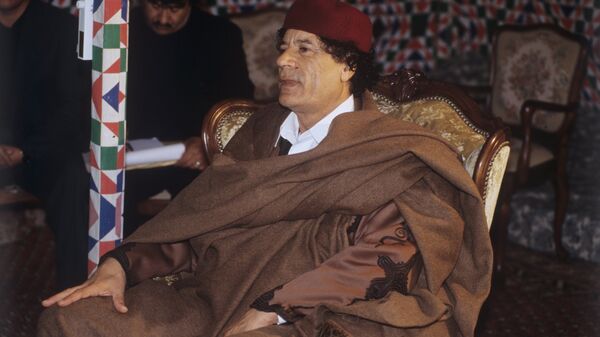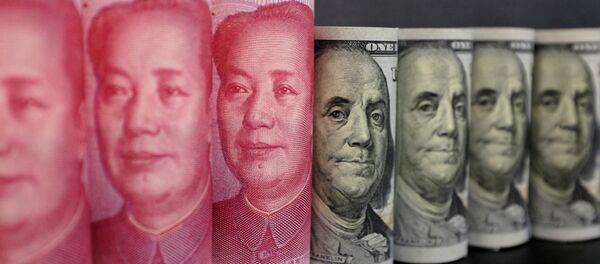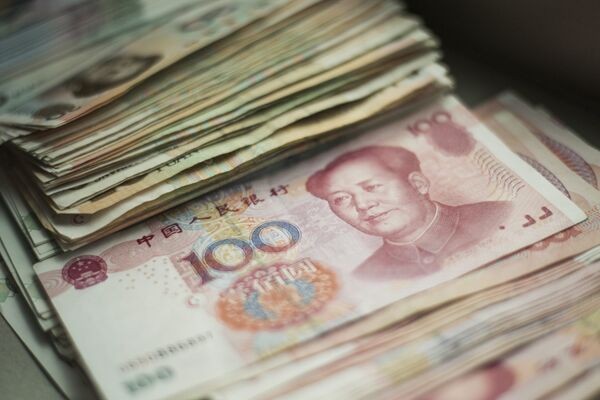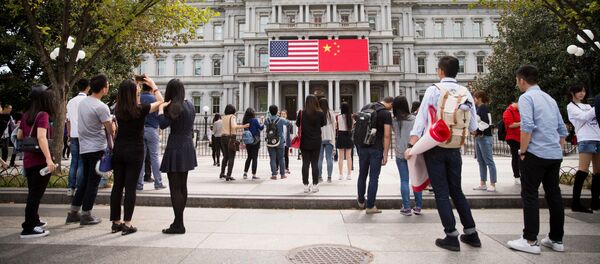Colonel Muammar Gaddafi's idea to create a pan-African gold-backed currency was by no means a viable solution, Wall Street analyst and investigative journalist Charles Ortel noted in an interview with Sputnik.
"Investors sorely need a 'solid' currency and/or instrument that will be managed to hold intrinsic values against key references. That was never going to be a Libyan anything; they and the African financial markets are far away from being transparent and [offering] reliable counterparty risks. Such a currency and/or instrument should emerge — it is sorely needed. But who can anyone really trust these days?" the analyst asked rhetorically.
"This plan was designed to provide, the Francophone African Countries with an alternative to the French franc (CFA)… French intelligence officers discovered this plan shortly after the current rebellion began, and this was one of the factors that influenced President Nicolas Sarkozy's decision to commit France to the attack on Libya," the email said.
Meanwhile, Tom McGregor, a Beijing-based political analyst and Asia-Pacific commentator for China's national TV broadcaster CNTV, questioned the viability of Gaddafi's plan: "From a business perspective, such a move would be foolish, causing gold prices to soar and nations would utilize their gold reserves for weaponization."
"When diplomatic tensions ensue, gold would get priced out of the market and the people hardest hit would be the Africans, unless they are the gold mine owners," McGregor suggested in an interview with Sputnik. "But as we all know, the real owners of most African gold mines are usually non-African investors. So how can ordinary Africans benefit from a gold-backed Pan-African currency? They would not. Only the gold bugs would."
Will the Petro-Yuan Emerge as the Petrodollar's Competitor?
Drawing parallels between Gaddafi's plan to create an alternative currency and the emergence of the Chinese "petro-yuan" some observers assumed that Beijing has a chance to use the colonel's idea to dethrone the US petrodollar that has maintained its dominance since the 1970s.
On March 26, China launched yuan-denominated oil futures on the Shanghai International Energy Exchange. Speaking to Radio Sputnik, Bill Holter, a US precious metals broker and analyst, presumed that the move "will obviously impact the price of the [US] dollar."
He explained that "the dollar has been supported literally by the energy complex worldwide" and China's oil trade in yuan is "going to create less demand for the dollar, which should create lower price, lower value."
"At root, the truth likely depends upon attitudes oil producers have concerning ownership of the Chinese currency," Ortel pointed out, commenting on the introduction of yuan-denominated futures. "If producers are comfortable, then a broader market in yuan-denominated instruments may evolve. If not, then transactions may start out in yuan, only to find that recipients of the Chinese currency elect to sell for other currencies."
The Wall Street analyst noted that "looking at the small size of the Chinese consumption market compared to that in the US, I question the wisdom of this move, especially also considering the monstrous bubble in 'investment' seen in UNCTAD [the United Nations Conference on Trade and Development] as previously discussed."
"Finally, China is not yet a massive energy producer, unlike Russia and the US, so I wonder how quickly the Chinese move will become less of a hedging exercise and more of a speculation," the analyst opined.
Tariff War: 'Unequal Treatment' and 'Unfair Practices'
Meanwhile, the US and China have found themselves involved in a fierce tariff war, which appears to have the potential to translate into a large-scale trade war.
However, according to US President Donald Trump, America lost this competition long ago.
"We are not in a trade war with China," Trump tweeted on April 4. "That war was lost many years ago by the foolish, or incompetent, people who represented the US. Now we have a Trade Deficit of $500 Billion a year, with Intellectual Property Theft of another $300 Billion. We cannot let this continue!"
We are not in a trade war with China, that war was lost many years ago by the foolish, or incompetent, people who represented the U.S. Now we have a Trade Deficit of $500 Billion a year, with Intellectual Property Theft of another $300 Billion. We cannot let this continue!
— Donald J. Trump (@realDonaldTrump) 4 апреля 2018 г.
Washington is going to introduce additional tariffs on up to $60 billion of Chinese imports over the allegedly unfair competition. On March 22, the US president signed an executive memorandum to impose the measure. For its part, Beijing has already taken certain counter-measures.
When asked about the prospects of a potential trade war, Ortel suggested looking at the problem from the point of view of the Americans.
"The Chinese 'trade war' is about unequal treatment inside home markets by respective nations, and because many are growing to realize that integrated production may make much more sense than complex multi-national approaches. Simply put, more Americans are best off when products bound for American consumers are made here — certainly with notable exceptions," he explained.
"Europe is not a viable 'union' and even the largest European nations are small consumers who share a common interest with America in cracking through unfair Chinese practices that make competition difficult against Chinese actors inside their market," Ortel opined.
However, the ongoing war of tariffs has already prompted serious concerns among analysts.
Speaking to Radio Sputnik's Loud & Clear with Brian Becker, Steve Keen, an Australian economist and author, warned that the US-China tariff battles could "disrupt supply chains, because American corporations are dependent on output from China for their production processes even when [the final goods] are made in America."
The two economies have become increasingly interdependent over the past decades; in addition, their fierce struggle could give the shivers to global economy.
The views and opinions expressed by the contributors do not necessarily reflect those of Sputnik.







